-
ORIGINAL ARTICLE03-27-2023
RESVECH 2.0: cross-cultural adaptation for Brazil, reliability and validity for the evaluation of venous ulcers
Revista Brasileira de Enfermagem. 2023;76(2):e20220185
Abstract
ORIGINAL ARTICLERESVECH 2.0: cross-cultural adaptation for Brazil, reliability and validity for the evaluation of venous ulcers
Revista Brasileira de Enfermagem. 2023;76(2):e20220185
DOI 10.1590/0034-7167-2022-0185
Views0See moreABSTRACT
Objectives:
to cross-culturally adapt the scale Resultados en la valoración y evolución de la cicatrización de las heridas – RESVECH 2.0 for Brazilian Portuguese; to estimate the internal consistency and construct and criterion validity of the scale in the evaluation of venous ulcers.
Methods:
methodological study, based on international guidelines for studies of this type. Wounds were evaluated using the RESVECH 2.0 and Pressure Ulcer Scale of Healing 3.0 (PUSH). Descriptive analysis, confirmatory factor analysis, Cronbach’s alpha and Spearman’s correlation (p<0.05) were used.
Results:
12 nurses and 77 people with 153 venous ulcers participated in the study. The translation was successful, the proposed factor model was validated, and Cronbach ‘s alpha = 0.832 (95%CI, 0.780-0.880) and correlation coefficient (RESVECH 2.0 and PUSH 3.0) = 0.74 were obtained.
Conclusions:
the adaptation of RESVECH 2.0 to Brazilian Portuguese is robust. Reliability and validity show compatibility for use in the country in the evaluation of venous ulcers.
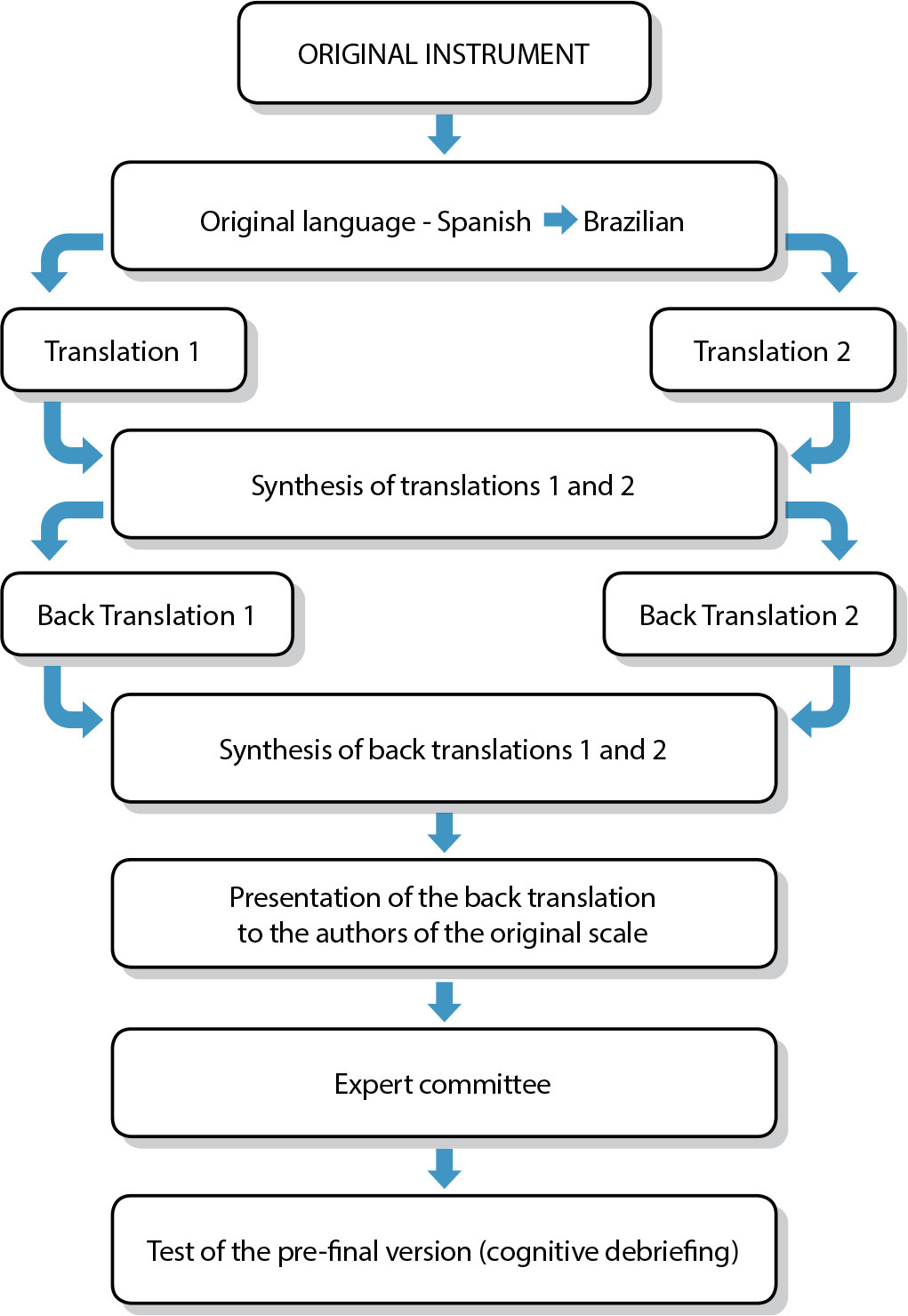
-
ORIGINAL ARTICLE03-27-2023
Prevalence of characteristics associated with sarcopenia in elders: a cross-sectional study
Revista Brasileira de Enfermagem. 2023;76(2):e20220209
Abstract
ORIGINAL ARTICLEPrevalence of characteristics associated with sarcopenia in elders: a cross-sectional study
Revista Brasileira de Enfermagem. 2023;76(2):e20220209
DOI 10.1590/0034-7167-2022-0209
Views0See moreABSTRACT
Objectives:
to identify the prevalence and characteristics associated with sarcopenia in elders in Primary Health Care Units.
Methods:
cross-sectional study with 384 elders. To evaluate sarcopenia, we measured: strength and muscle mass, and physical performance. The elderly were classified as having: probable sarcopenia; sarcopenia; or severe sarcopenia. The chi-squared test and the multinomial logistic regression method were used.
Results:
the prevalence of probable sarcopenia was 25.52%; of sarcopenia, 11.98%; and of severe sarcopenia, 9.90%. Probable sarcopenia is 1.75 times more prevalent in men; osteoporosis is 2.16 times more prevalent in people with severe sarcopenia; polypharmacy is 1.57 times more likely in individuals with probable sarcopenia; and calf circumference below 31 cm is 2.24 times more likely in patients with sarcopenia and 2.19 times more likely in patients with severe sarcopenia.
Conclusions:
the highest prevalence was of probable sarcopenia, and the characteristics associated with sarcopenia were sex, osteoporosis, polypharmacy, overweight, obesity, and calf circumference.
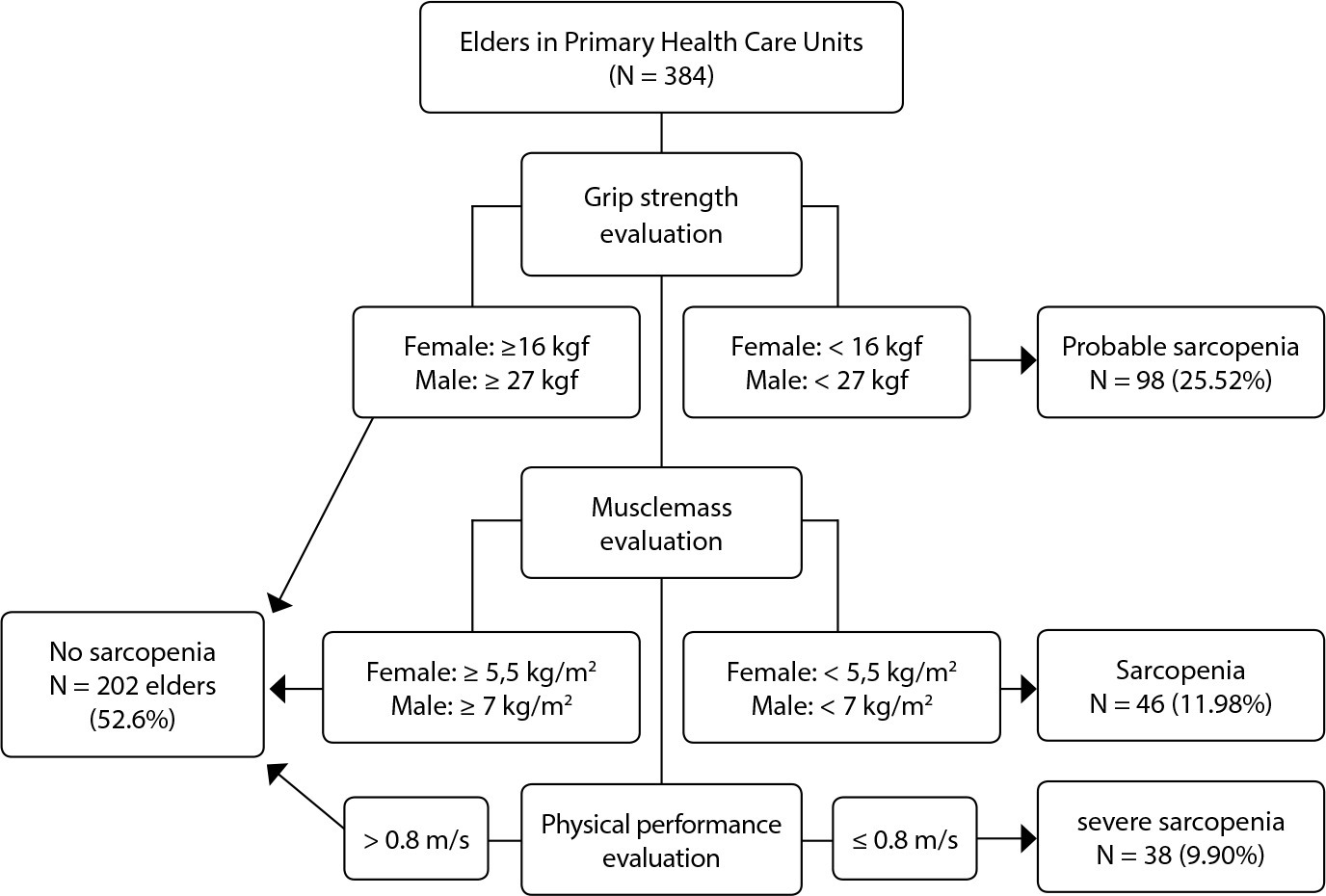
-
ORIGINAL ARTICLE03-27-2023
Outline of a project for nursing health education on the Instagram social network
Revista Brasileira de Enfermagem. 2023;76(2):e20220301
Abstract
ORIGINAL ARTICLEOutline of a project for nursing health education on the Instagram social network
Revista Brasileira de Enfermagem. 2023;76(2):e20220301
DOI 10.1590/0034-7167-2022-0301
Views0See moreABSTRACT
Objectives:
to characterize the outline of a project for health education and its contributions to the propagation of information on the Instagram social network.
Methods:
exploratory and descriptive research on an Instagram profile called ;. Data collection: from July 23, 2020, to April 21, 2021. Interaction metrics were generated on 36 posts. Simple and percentage statistical analysis were applied.
Results:
there are 1,016 followers in Brazil, with a 206.02% growth. The largest audience is teenagers, young people, and women, with a gender difference of 41.8%. The greatest interest was about covid-19, sexual health, and drugs. Followers’ misconceptions reinforce the need for the dissemination of quality information.
Conclusions:
Instagram metrics point to the project’s validation in terms of audience interest, mostly adolescents and youth. Instagram proved to be powerful for educational purposes and information dissemination, as well as an autonomous field for nursing.

-
ORIGINAL ARTICLE03-27-2023
Adaptation and validation of an adult patient classification instrument with emphasis on the family dimension
Revista Brasileira de Enfermagem. 2023;76(2):e20220530
Abstract
ORIGINAL ARTICLEAdaptation and validation of an adult patient classification instrument with emphasis on the family dimension
Revista Brasileira de Enfermagem. 2023;76(2):e20220530
DOI 10.1590/0034-7167-2022-0530
Views1See moreABSTRACT
Objectives:
to adapt and validate an instrument for classifying adult patients that emphasizes the family support network in the demand for nursing care.
Methods:
methodological study, carried out in three phases: adaptation of an instrument considering the reality of adult patients; content validation with seven experts and assessment of measurement properties (construct validity and internal consistency) with 781 hospitalized patients.
Results:
in content validation, the indicators reached the values established for the Content Validity Index (0.85-1.00). In the confirmatory factor analysis, the 11 indicators were distributed in three domains and presented average variance extracted and factor loading greater than 0.5. Composite reliability was greater than 0.7.
Conclusions:
the present study adapted and made available, with evidence of validity and reliability, an instrument for classifying adult patients that considers the family support network in the demand for nursing care.

-
ORIGINAL ARTICLE03-17-2023
Features of the triggering of the yellow code and factors associated with the occurrence of adverse events
Revista Brasileira de Enfermagem. 2023;76(2):e20220181
Abstract
ORIGINAL ARTICLEFeatures of the triggering of the yellow code and factors associated with the occurrence of adverse events
Revista Brasileira de Enfermagem. 2023;76(2):e20220181
DOI 10.1590/0034-7167-2022-0181
Views0See moreABSTRACT
Objective:
to analyze the characteristics of the activation of the yellow code in wards and identify the factors associated with adverse events after the Rapid Response Team.
Methods:
a cross-sectional study with retrospective analysis of medical records of adults admitted to medical or surgical clinic wards of the University Hospital of São Paulo.
Results:
among the 91 patients, the most frequent signs of triggers (n=107) were peripheral oxygen saturation of less than 90% (40.2%) and hypotension (30.8%). Regarding the associated factors the research identified each minute of attendance of the Rapid Response Team in the wards increased by 1.2% odds of adverse events (twenty-four unplanned admission in the ICU and one cardiac arrest) in the sample (p=0.014).
Conclusions:
decreased oxygen saturation and hypotension were the main reasons for the triggering, and the length of care was associated with the frequency of adverse events.
-
ORIGINAL ARTICLE03-17-2023
Characteristics of work in primary care identified in the collective exercise of application of the SWOT matrix
Revista Brasileira de Enfermagem. 2023;76(2):e20220443
Abstract
ORIGINAL ARTICLECharacteristics of work in primary care identified in the collective exercise of application of the SWOT matrix
Revista Brasileira de Enfermagem. 2023;76(2):e20220443
DOI 10.1590/0034-7167-2022-0443
Views0See moreABSTRACT
Objective:
to understand how variables strengths, weaknesses, opportunities and threats make it possible to characterize work in Primary Health Care, to collectively propose strategies for systematizing this process with Family Health teams.
Methods:
methodological research, with 23 participants in direct relationship with Primary Care, including representatives of segments: care (work), management and social control. In one of the three pedagogical meetings, the SWOT matrix was used as a tool for organizational work planning.
Results:
applying the matrix resulted in the following thematic categories: Teamwork and regulations: key elements for interprofessionality at work; Continuing Health Education: path to autonomy and participatory management (co-management).
Final considerations:
the study promoted the systematization of teams’ work, through the mobilization of sectors and distribution of tasks, involving professionals in the co-management of the process.
-
ORIGINAL ARTICLE03-17-2023
Professional autonomy in dealing with complications: discourse of obstetric nurses working in planned home births
Revista Brasileira de Enfermagem. 2023;76(2):e20220388
Abstract
ORIGINAL ARTICLEProfessional autonomy in dealing with complications: discourse of obstetric nurses working in planned home births
Revista Brasileira de Enfermagem. 2023;76(2):e20220388
DOI 10.1590/0034-7167-2022-0388
Views0See moreABSTRACT
Objective:
to understand the exercise of professional autonomy by obstetric nurses in dealing with complications in planned home births.
Methods:
this is a qualitative study, supported by the Discourse of the Collective Subject methodological framework, whose data collection took place from January to March 2021, through interviews guided by a semi-structured script, in which seven midwives who are members of a childbirth care collective in northeastern Brazil and who work in the home context participated.
Results:
four central ideas emerged from the collective discourses related to the exercise of professional autonomy by obstetric nurses: shared decisions; theoretical-practical instrumentalization; professional expertise; and teamwork.
Final considerations:
obstetric nurses’ autonomy in the face of complications reflects the safety of planned home births and is based on collective critical thinking, reinforcing this professional’ leading role in obstetrics.
-
ORIGINAL ARTICLE03-17-2023
Production and validation of an educational video on the use of the Z-Track Technique
Revista Brasileira de Enfermagem. 2023;76(2):e20220439
Abstract
ORIGINAL ARTICLEProduction and validation of an educational video on the use of the Z-Track Technique
Revista Brasileira de Enfermagem. 2023;76(2):e20220439
DOI 10.1590/0034-7167-2022-0439
Views0See moreABSTRACT
Objective:
to create and validate an educational video on intramuscular drug administration using the Z-track technique.
Methods:
the Delphi Technique was used to validate the script. PhDs in Nursing and PhDs in Social Communication with experience in the production of educational videos participated in the process. After editing, the video was validated by three nursing professors and assessed by students of the undergraduate nursing program at a public university.
Results:
the video was validated by the examiners with 100% agreement in three rounds for script validation and in two for video validation after editing. The duration of the video was 9 minutes.
Conclusion:
after validation by the examiners, students assessed the video and considered it suitable for learning. We This video is expected to aid in the training of nursing professionals and the enhancement of patient care.
-
ORIGINAL ARTICLE12-08-2023
Simulation-based training in Leprosy: development and validation of a scenario for community health workers
Revista Brasileira de Enfermagem. 2023;76:e20230114
Abstract
ORIGINAL ARTICLESimulation-based training in Leprosy: development and validation of a scenario for community health workers
Revista Brasileira de Enfermagem. 2023;76:e20230114
DOI 10.1590/0034-7167-2023-0114
Views0See moreABSTRACT
Objectives:
To build and validate a clinical simulation scenario designed to instruct community health workers (CHWs) in active leprosy case detection.
Methods:
Methodological study involving the development of a simulated clinical scenario and content validation by experts. The Content Validity Index (CVI) was used to determine the level of agreement among the judging commitee, and a descriptive analysis of their recommendations was performed.
Results:
A simulated scenario with a simulated participant was developed — a simulation characterized by low complexity, moderate physical/environmental fidelity, moderate to high psychological fidelity, and high conceptual fidelity, lasting 50 minutes and capable of training up to 10 CHWs simultaneously. The scenario was validated by 14 experts, with a CVI exceeding 80% for all components.
Conclusions:
The validated clinical simulation possesses attributes that make it highly reproducible in various national health contexts, thereby contributing to the global “Towards Zero Leprosy” strategy.
-
ORIGINAL ARTICLE12-08-2023
Knowledge and practices about health among Quilombola men: contributions to health care
Revista Brasileira de Enfermagem. 2023;76:e20230138
Abstract
ORIGINAL ARTICLEKnowledge and practices about health among Quilombola men: contributions to health care
Revista Brasileira de Enfermagem. 2023;76:e20230138
DOI 10.1590/0034-7167-2023-0138
Views1See moreABSTRACT
Objective:
to analyze health knowledge and practices among Quilombola men.
Methods:
a qualitative, descriptive study, carried out with 40 men from two Quilombola communities in Santa Izabel do Pará, state of Pará, Brazil. Individual interviews were carried out using a semi-structured script. Text corpus was subjected to analysis with Interface de R pour les Analyses Multidimensionnelles de Textes et de Questionnaires 0.6, alpha 3, through Descending Hierarchical Classification.
Results:
among participants, eight (20.00%) were aged 55 to 59 years. 382 text segments were identified, with 299 (78.27%) being used, generating five lexical classes, which made up two subcorpora. The classes were organized into four thematic axes, covering knowledge about health and practices to prevent and solve health problems.
Final considerations:
men highlighted popular/traditional wisdom permeated by biomedical knowledge, translating their understanding of how to act to remain or become healthy.

-
ORIGINAL ARTICLE10-06-2023
Ethical problems in nursing teleconsultations for people living with HIV during the Covid-19 pandemic
Revista Brasileira de Enfermagem. 2023;76:e20220754
Abstract
ORIGINAL ARTICLEEthical problems in nursing teleconsultations for people living with HIV during the Covid-19 pandemic
Revista Brasileira de Enfermagem. 2023;76:e20220754
DOI 10.1590/0034-7167-2022-0754
Views0See moreABSTRACT
Objectives:
to understand the ethical problems experienced by primary health care nurses in using nursing teleconsultations for people living with the human immunodeficiency virus during the coronavirus pandemic.
Methods:
qualitative research, anchored in Constructivist Grounded Theory. Data was collected between July and September 2020, with 17 participants.
Results:
the first category highlights the ethical problems in conducting teleconsultations, managing high demand, communication barriers, and risks related to data security. The second emphasizes the potential of teleconsultations in communication and access, by generating changes in the work process and the use of protocols to guide clinical practice.
Conclusions:
nurses’ work in digital mode requires professional qualification, with a view to stimulating reflection on teleconsultation practice, ethical-moral deliberation and combating stigma, and also adopting data security-centered conduct.
-
12-04-2023
Ethical dilemmas at the end of life: a reflection from the Philosophical Perspective of Luigina Mortari
Revista Brasileira de Enfermagem. 2023;76:e20220759
Abstract
Ethical dilemmas at the end of life: a reflection from the Philosophical Perspective of Luigina Mortari
Revista Brasileira de Enfermagem. 2023;76:e20220759
DOI 10.1590/0034-7167-2022-0759
Views0See moreABSTRACT
Objectives:
to reflect on the ethical dilemmas involved in the care of patients at the end of their lives.
Methods:
this is a theoretical-reflective study based on the ethics of care proposed by Luigina Mortari.
Results:
discussing care involves addressing the ways of being inherent to human existence and understanding the unique characteristics of this condition. Ethical care constitutes an action driven by interest in the other and by the perception of their need. Ethical dilemmas are a part of end-of-life care, making it essential to maintain respectful assistance that considers the patient’s autonomy, using strategies for expressing their wishes, and ensuring continuous clear and empathetic communication among all those involved in providing care.
Final Considerations:
issues related to being, stemming from one’s reality of dependency and vulnerability, contribute to the emergence of ethical dilemmas present in care actions.
-
ORIGINAL ARTICLE12-04-2023
Overview of nursing ethics teaching in Brazilian public higher education institutions
Revista Brasileira de Enfermagem. 2023;76:e20220808
Abstract
ORIGINAL ARTICLEOverview of nursing ethics teaching in Brazilian public higher education institutions
Revista Brasileira de Enfermagem. 2023;76:e20220808
DOI 10.1590/0034-7167-2022-0808
Views0See moreABSTRACT
Objectives:
to outline the teaching of ethics in undergraduate Nursing programs in Brazilian public higher education institutions.
Methods:
descriptive and exploratory study, carried out through the documentary analysis of pedagogical projects of undergraduate Nursing programs in Brazil.
Results:
153 active undergraduate Nursing programs were found, of which 106 provide the pedagogical project. In addition to deontological teaching, the teaching of ethics was identified in a transversal way associated with themes such as Social Context, Hospital and Community Care, Pharmacology, Systematization of Nursing Care, Surgical Nursing, Epidemiology, Palliative Care, Management in Nursing, Diversity, Women’s, Children’s, Adolescent’s, Adult’s and Older People’s Health, and Mental Health.
Final Considerations:
the challenge in teaching nursing ethics is its integration with each action of caring, teaching and managing.

-
ORIGINAL ARTICLE12-08-2023
Validation of telesimulation in the care of late preterm newborns with hypoglycemia for nursing students
Revista Brasileira de Enfermagem. 2023;76:20220438
Abstract
ORIGINAL ARTICLEValidation of telesimulation in the care of late preterm newborns with hypoglycemia for nursing students
Revista Brasileira de Enfermagem. 2023;76:20220438
DOI 10.1590/0034-7167-2022-0438
Views0See moreABSTRACT
Objective:
To develop and validate a telesimulation scenario for nursing students in the care of late preterm infants with hypoglycemia.
Methods:
A methodological study conducted between August 2021 and May 2022 in a virtual environment involved constructing and validating the scenario with 10 experts, and testing it with 10 students. The content validity index assessed validity, with a threshold of 80% or higher, and suggestions were analyzed using semantic approximation.
Results:
Validation confirmed the appropriateness of all 14 scenario items, with an overall index of 97.8% and clarity and relevance indices of 98.5%. During testing, the overall index was 99.7%, with the “resources” item receiving the lowest score. Adjustments were made to objectives, technical terms, resources, and target audience based on feedback.
Conclusion:
Telesimulation is a widely accepted educational technology for training nursing students, with potential to enhance teaching quality and neonatal care.
-
ORIGINAL ARTICLE11-10-2023
Construction and validity of educational technology in audiovisual media on premature newborn care
Revista Brasileira de Enfermagem. 2023;76:e20220403
Abstract
ORIGINAL ARTICLEConstruction and validity of educational technology in audiovisual media on premature newborn care
Revista Brasileira de Enfermagem. 2023;76:e20220403
DOI 10.1590/0034-7167-2022-0403
Views0See moreABSTRACT
Objectives:
to construct and validate an educational video storyboard about care for premature newborns at home.
Methods:
a methodological study, with the construction of an educational video storyboard, validated with 14 judges. Content was selected from scoping review. For data collection, a validated instrument was used. The criterion for validity was agreement greater than 80%, analyzed using the Content Validity Index.
Results:
the storyboard construction was guided by the Cognitive Theory of Multimedia Learning theoretical framework. Construction and validity took place from May to December 2020. The storyboard’s final version lasted 10 minutes, and was validated in terms of objective, structure, presentation and relevance, with a Content Validity Index of 0.9.
Conclusions:
the storyboard of the educational video proved to be valid and adequate for health promotion in developing care for premature newborns at home.

-
ORIGINAL ARTICLE12-08-2023
Early ambulation and dhikr complementary therapies effect on intestinal peristaltic in post-open cholecystectomy patients
Revista Brasileira de Enfermagem. 2023;76:e20220636
Abstract
ORIGINAL ARTICLEEarly ambulation and dhikr complementary therapies effect on intestinal peristaltic in post-open cholecystectomy patients
Revista Brasileira de Enfermagem. 2023;76:e20220636
DOI 10.1590/0034-7167-2022-0636
Views0ABSTRACT
Objectives:
to analyze and determine the effect of a combination intervention of early ambulation and dhikr therapy on intestinal peristaltic recovery in post-open cholecystectomy patients.
Methods:
a pre-experimental design with one group pre and post-test design was used. The samples were 15 post-open cholecystectomy patients which were selected using the purposive sampling technique. The data were collected using the instrument observation sheet and analyzed using the Wilcoxon test. Early ambulation used standard operational procedure in the hospital and dhikr therapy was carried out at 2 hours post-operation for 10-15 minutes.
Results:
there was an effect of early ambulation and dhikr therapy on intestinal peristaltic recovery in post-open cholecystectomy patients with general anesthesia (Z=-3.442; p=0.001).
Conclusions:
a combination of early ambulation and dhikr therapy can be recommended as interventions to improve intestinal peristaltic in a post-open cholecystectomy patient with general anesthesia.
Keywords:Anesthesia, GeneralCholecystectomyComplementary TherapiesEarly AmbulationPerioperative NursingSee more
-
EXPERIENCE REPORT04-09-2020
Implementation of an Artificial Intelligence Algorithm for sepsis detection
Revista Brasileira de Enfermagem. 2020;73(3):e20180421
Abstract
EXPERIENCE REPORTImplementation of an Artificial Intelligence Algorithm for sepsis detection
Revista Brasileira de Enfermagem. 2020;73(3):e20180421
DOI 10.1590/0034-7167-2018-0421
Views0See moreABSTRACT
Objectives:
to present the nurses’ experience with technological tools to support the early identification of sepsis.
Methods:
experience report before and after the implementation of artificial intelligence algorithms in the clinical practice of a philanthropic hospital, in the first half of 2018.
Results:
describe the motivation for the creation and use of the algorithm; the role of the nurse in the development and implementation of this technology and its effects on the nursing work process.
Final Considerations:
technological innovations need to contribute to the improvement of professional practices in health. Thus, nurses must recognize their role in all stages of this process, in order to guarantee safe, effective and patient-centered care. In the case presented, the participation of the nurses in the technology incorporation process enables a rapid decision-making in the early identification of sepsis.
-
ORIGINAL ARTICLE06-27-2019
Caring for the carer: quality of life and burden of female caregivers
Revista Brasileira de Enfermagem. 2019;72(3):728-736
Abstract
ORIGINAL ARTICLECaring for the carer: quality of life and burden of female caregivers
Revista Brasileira de Enfermagem. 2019;72(3):728-736
DOI 10.1590/0034-7167-2018-0334
Views0See moreABSTRACT
Objective:
To assess the quality of life and the burden of female caregivers.
Method:
Descriptive, cross-sectional, quantitative study carried out with 224 informal caregivers from March to July 2016. Three instruments were used: a characterization form for the caregiver, the WHOQOL-Bref questionnaire and the Zarit Burden Interview. The following tests were used: Cronbach’s Alpha, Kolmogorov-Smirnov, Kruskal-Wallis, Spearman and Mann-Whitney.
Results:
The mean age of caregivers was 51.8 years with a standard deviation of 13.7. They were predominantly married, had a low income and low level of education, were first-degree relatives, had been providing care for one to five years and presented some pathology. The associations of quality of life that presented statistical significance were: income, marital status, number of people living with the caregiver and time of care.
Conclusion:
The burden was negatively correlated with QOL, that is, the greater the burden, the more impaired will be the life of these caregivers.
-
REVIEW03-24-2021
Development of clinical competence in nursing in simulation: the perspective of Bloom’s taxonomy
Revista Brasileira de Enfermagem. 2021;74(1):e20200135
Abstract
REVIEWDevelopment of clinical competence in nursing in simulation: the perspective of Bloom’s taxonomy
Revista Brasileira de Enfermagem. 2021;74(1):e20200135
DOI 10.1590/0034-7167-2020-0135
Views0See moreABSTRACT
Objectives:
to investigate the scientific evidence on the use of Bloom’s taxonomy for developing competence in nursing professionals and students in clinical simulation.
Methods:
integrative review of the National Library of Medicine (NLM), National Institutes of Health (NIH), Cumulative Index to Nursing and Allied Health Literature (CINAHL), Latin American and Caribbean Literature in Health Sciences (LILACS), Web of Science and SCOPUS databases, using the Rayyan application.
Results:
a total of 871 studies were identified; four composed the sample. The development of clinical competence occurred through the coordination of knowledge, skills, and attitudes. To develop the cognitive domain, the objectives of knowledge and comprehension of the Bloom’s taxonomy were mobilized. The psychomotor domain required development of the skills demanded by the proposed clinical care. The affective domain was developed through will and motivation to learn.
Conclusions:
it is possible to develop clinical competence in nursing by adopting Bloom’s taxonomy in each phase of clinical simulation.
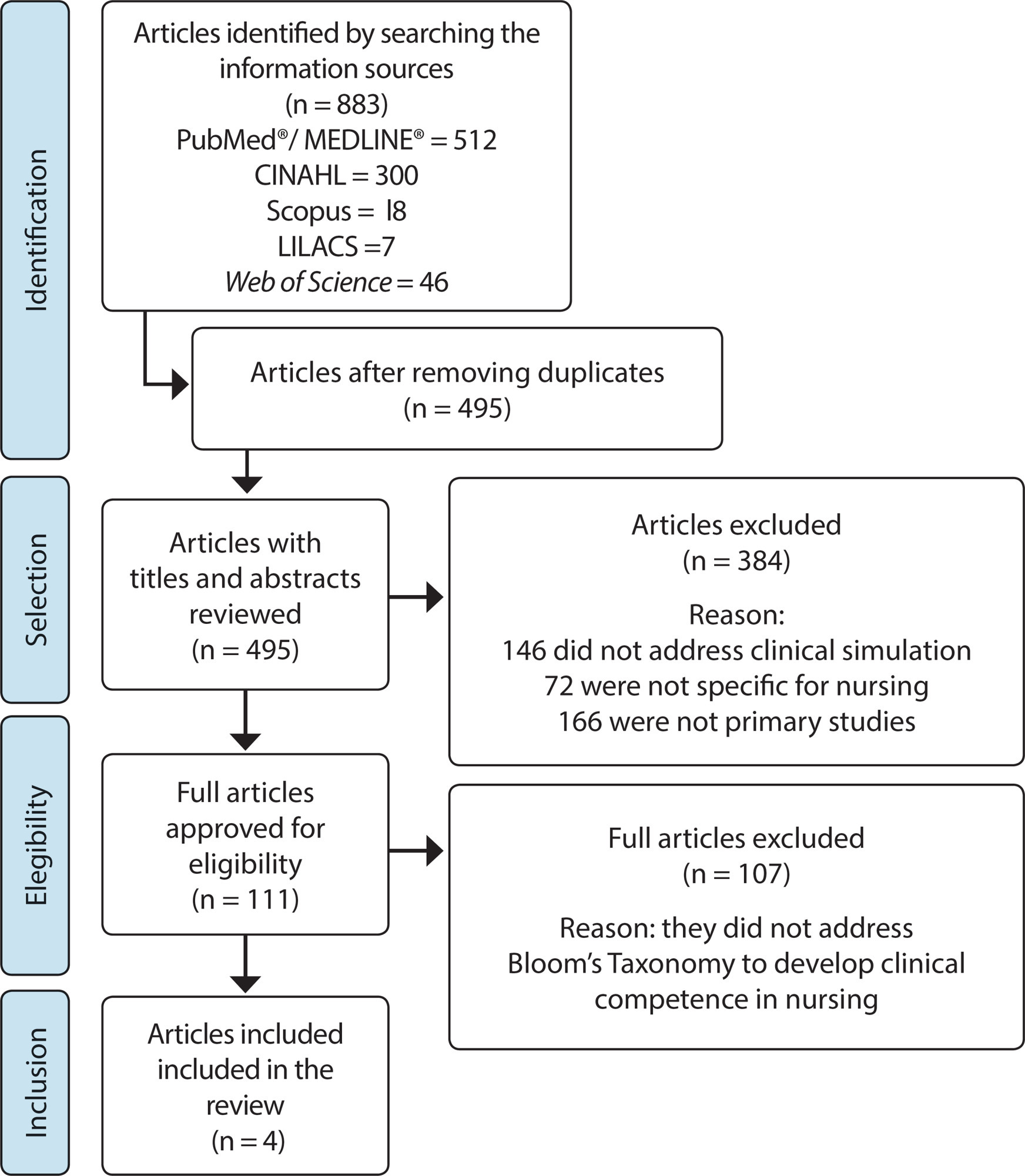
-
ORIGINAL ARTICLE06-27-2019
Package of menthol measures for thirst relief: a randomized clinical study
Revista Brasileira de Enfermagem. 2019;72(3):600-608
Abstract
ORIGINAL ARTICLEPackage of menthol measures for thirst relief: a randomized clinical study
Revista Brasileira de Enfermagem. 2019;72(3):600-608
DOI 10.1590/0034-7167-2018-0057
Views0See moreABSTRACT
Objective:
To evaluate the effectiveness of the menthol package (lip hydration and ice popsicles) compared to a package of non-menthol measures (lip hydration and ice popsicles) as a way to relieve thirst in patients in the Anesthetic Recovery Room.
Method:
Randomized and parallel trial study, with 120 patients randomized patients in an experimental group – menthol measurements (n=59) and control group – measures without menthol (n = 61).
Results:
There was a significant (p<0.05) decrease in intensity, hydration, dryness and taste in the oral cavity between the three moments of assessment/intervention in the two groups. The difference was significant in the experimental group for thirst intensity at the second assessment/intervention point (p<0.05) after a single administration of the menthol package.
Conclusion:
There was a reduction in thirst intensity in both groups. Patients who received menthol packages showed a significant decrease in intensity after a single evaluation/intervention time. NCT: 02869139.
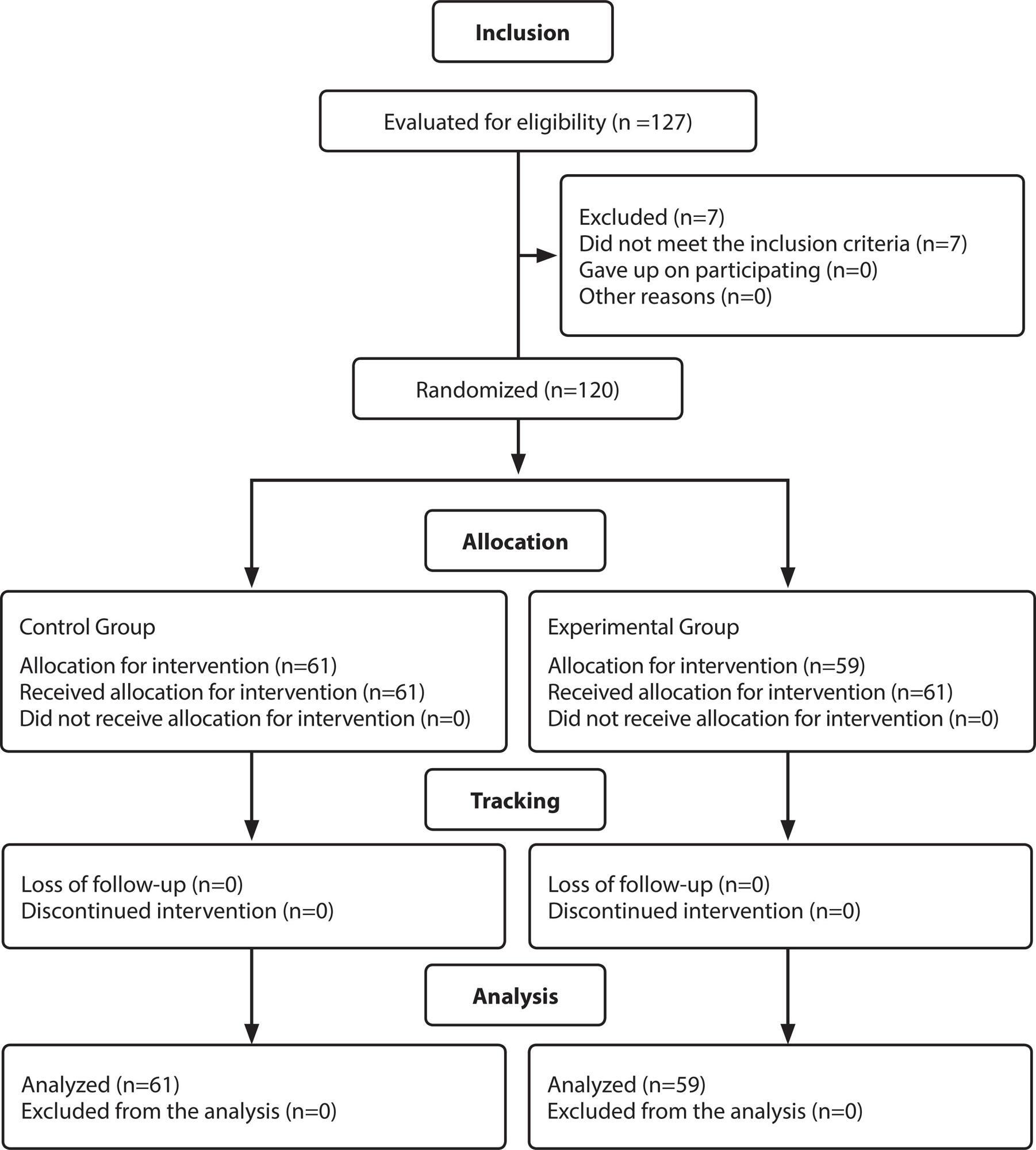
-
03-27-2020
Coronavirus 2020
Revista Brasileira de Enfermagem. 2020;73(2):e2020n2
Abstract
Coronavirus 2020
Revista Brasileira de Enfermagem. 2020;73(2):e2020n2
DOI 10.1590/0034-7167-2020730201
Views0Emerging and reemerging infectious diseases are constant challenges for public health worldwide. Recent cases of pneumonia of unknown cause in Wuhan, China, have led to the discovery of a new type of Coronavirus (2019-nCoV), which are enveloped RNA viruses, commonly found in humans, other mammals and birds, capable of causing respiratory, enteric, hepatic, and neurological […]See more -
ORIGINAL ARTICLE12-04-2020
Pressure injury related to the use of personal protective equipment in COVID-19 pandemic
Revista Brasileira de Enfermagem. 2020;73:e20200670
Abstract
ORIGINAL ARTICLEPressure injury related to the use of personal protective equipment in COVID-19 pandemic
Revista Brasileira de Enfermagem. 2020;73:e20200670
DOI 10.1590/0034-7167-2020-0670
Views0See moreABSTRACT
Objective:
To describe the prevalence and factors associated with pressure injuries related to the use of personal protective equipment during the COVID-19 pandemic.
Methods:
Cross-sectional study conducted using an instrument made available in social networks with 1,106 health professionals. The data were analyzed using descriptive statistics and compared, considering pvalue < 0.05.
Results:
There was a prevalence of 69.4% for pressure injuries related to the use of personal protective equipment, with an average of 2.4 injuries per professional. The significant factors were: under 35 years of age, working and wearing personal protective equipment for more than six hours a day, in hospital units, and without the use of inputs for protection.
Conclusion:
Pressure injuries related to the use of medical devices showed a high prevalence in this population. The recognition of the damage in these professionals makes it possible to advance in prevention strategies.
-
ORIGINAL ARTICLE12-13-2019
Accessibility of children with special health needs to the health care network
Revista Brasileira de Enfermagem. 2019;72:65-71
Abstract
ORIGINAL ARTICLEAccessibility of children with special health needs to the health care network
Revista Brasileira de Enfermagem. 2019;72:65-71
DOI 10.1590/0034-7167-2017-0899
Views0See moreABSTRACT
Objective:
To know how children with special health needs access the health care network.
Method:
This is a qualitative research of descriptive-exploratory type, developed using semi-structured interviews mediated by the Talking Map design. Participants were 19 family caregivers of these children in two Brazilian municipalities. Data were submitted to inductive thematic analysis.
Results:
Difficulties were mentioned from the diagnosis moment to the specialized follow-up, something represented by the itinerary of the c hild and his/her family in the search for the definition of the medical diagnosis and the access to a specialized professional; a gap between the children’s needs and the care offered was observed in primary health care.
Conclusion:
The access of children with special health needs is filled with obstacles such as slowness in the process of defining the child’s diagnosis and referral to a specialist. Primary health care services were replaced by care in emergency care units.
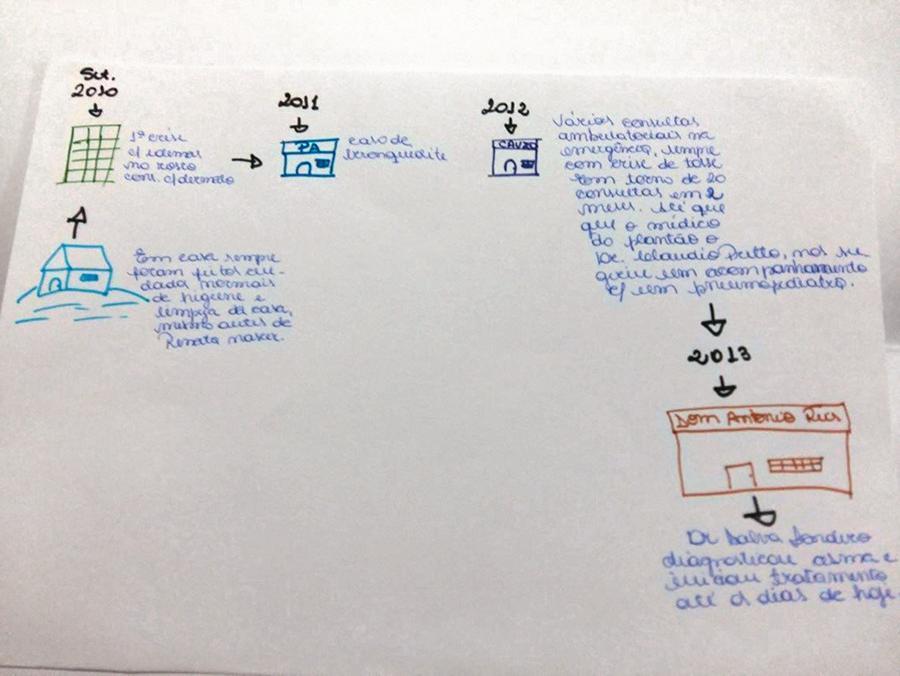
-
REVIEW12-05-2019
Vulnerability of the elderly: a conceptual analysis
Revista Brasileira de Enfermagem. 2019;72:337-344
Abstract
REVIEWVulnerability of the elderly: a conceptual analysis
Revista Brasileira de Enfermagem. 2019;72:337-344
DOI 10.1590/0034-7167-2018-0728
Views0See moreABSTRACT
Objective:
To analyze the concept of vulnerability of the elderly.
Method:
A concept analysis, according to the method proposed by Walker and Avant, operationalized through integrative review through search in scientific data portals using the
Descriptors:
Health vulnerability, aged, health services for the aged, health of the elderly, vulnerable populations and geriatric health services. To compose the literary corpus, 36 studies were selected.
Results:
Concept antecedents, as well as its attributes, were identified in individual, social and programmatic characteristics, which make up the characteristics of “vulnerability of the elderly”, besides consequences of the phenomenon. These characteristics were analyzed with emphasis on aspects that contribute to the process of vulnerability of the elderly.
Conclusion:
The study demonstrated the multidimensionality of the phenomena studied, highlighting the peculiarities of vulnerability during aging. However, there is a need for further studies on the construct.
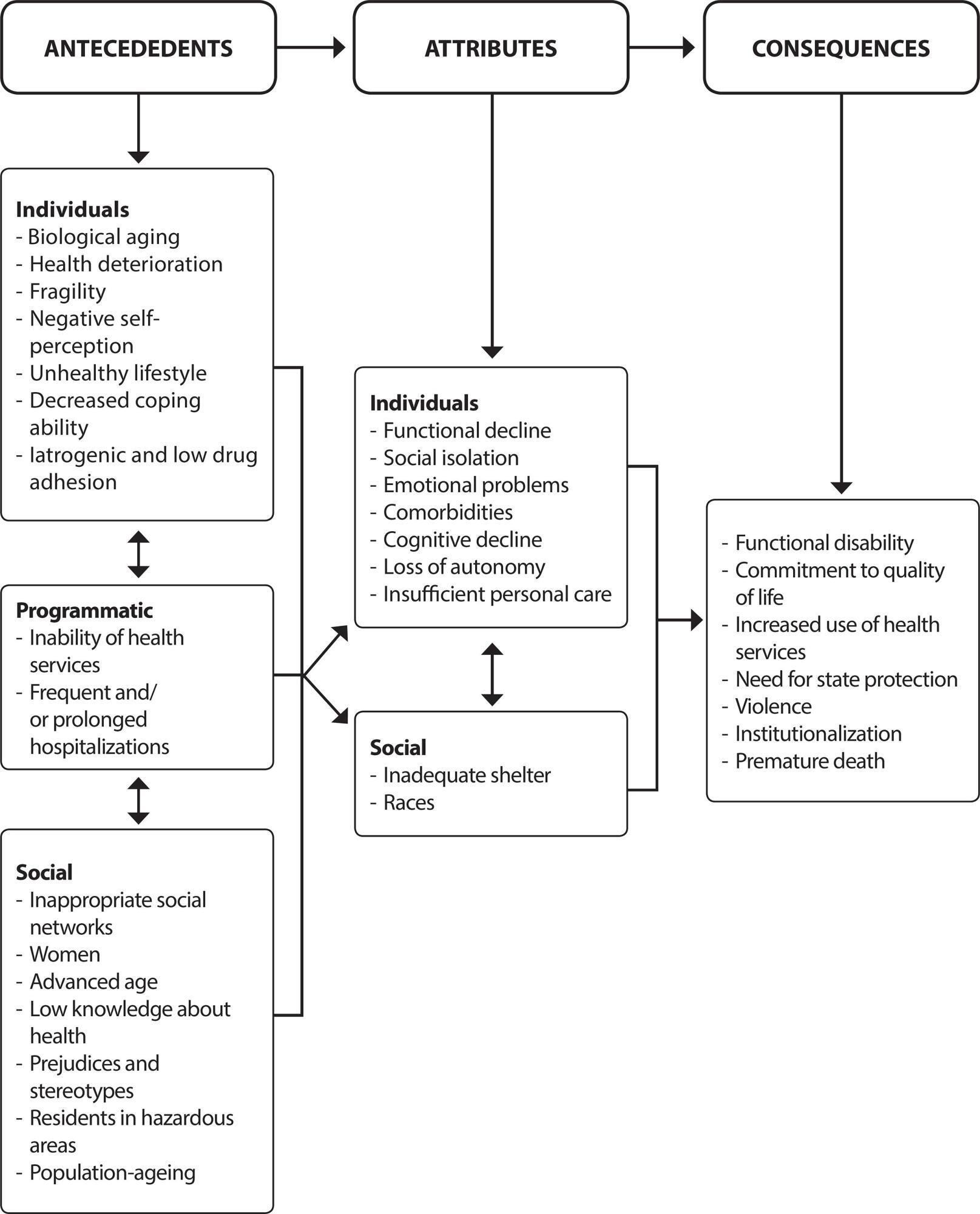
Search
Search in:
Nuvem de Tags
Adolescente (85) Atenção Primária à Saúde (239) COVID-19 (91) Criança (91) Cuidados de Enfermagem (269) Educação em Enfermagem (151) Educação em Saúde (139) Enfermagem (930) Enfermagem Pediátrica (86) Estudantes de Enfermagem (77) Estudos de Validação (131) Família (87) Idoso (208) Promoção da Saúde (99) Qualidade de Vida (104) Saúde do Trabalhador (86) Saúde Mental (145) Saúde Pública (82) Segurança do Paciente (150) Tecnologia Educacional (100)



